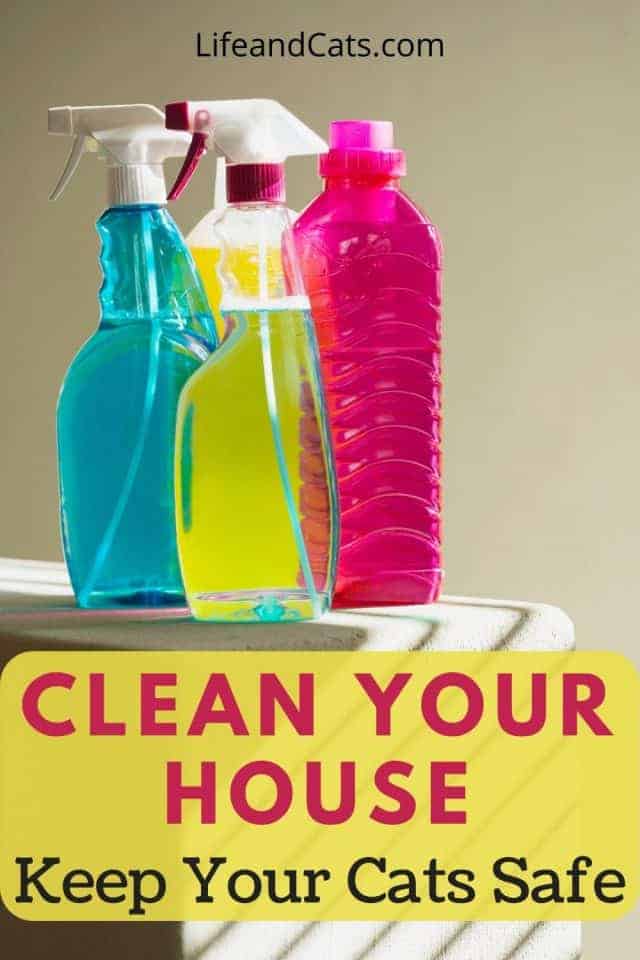Last Updated on July 30, 2021 by Holly Anne Dustin
March is Pet Poison Awareness Month. It is also the start of the spring cleaning season for many. The viruses out there this year makes getting our homes clean even more important. But many cleaning products on the market are not safe for our cats. What can we use to keep our houses clean and our cats safe?
Household cleaners are one of the top five poisoning risks for cats. 6% of the cat-related calls to the Poison Helpline are related to common household cleaners. Disinfectants, multi-surface cleaners, deodorizers, essential oils, and laundry detergents, among others, are toxic to cats.
Poisons can be ingested directly, groomed off the fur, absorbed through the skin, or inhaled. Cats are particularly sensitive to being poisoned because of their size, their grooming skills, and the fact that their systems lack glucuronosyltransferase liver enzymes necessary to process many chemicals and plant-based materials.
So how can we get our homes clean, odor-free, and germ-free but still keep our furbabies safe?
Contents
Cleaning Products That are Toxic to Cats
This post may contain affiliate links. Life and Cats is a Chewy affiliate and a member of the Amazon Associates program and as such we earn a small commission when you shop through our our links and banners. It doesn’t change the amount you pay. You can read our full disclosure policy here.
Surface Cleaners
- Ammonia: Found in oven cleaners, window cleaner, floor strippers.
- Glycol Ethers: Commonly listed as 2-Methoxyethanol, 2-Ethoxyethanol, and 2-Butoxyethanol. Attracts pets in the same way that antifreeze does.
- Formaldehyde: Other names for formaldehyde include: formalin, formic aldehyde, methanediol, methanol, methyl aldehyde, methylene glycol, and methylene oxide.
- Phthalates: Includes BPA.
- Phenol: Pine-Sol, Dettol and other cleaners that turn white or milky in water.
- Triclosan: Antibacterial cleaner.
- Essential Oils: Tea Tree, Lavender, anything with phenols, and citrus are all harmful to cats.
Popular products like Lysol, Clorox Wipes, Simple Green, Purell Surface Wipes all contain products that are harmful to your kitties.
Be careful with the “natural” cleaners on the market. Many of them are labeled pet-friendly even though they contain essential oils or glycol ethers. Some of them are better choices than others. I usually use Better Life or Method brands. Puracy is another good brand.
Enzyme-based cleaners are the best solution for organic pet messes like pee, poop, or vomit. Nature’s Miracle is the line I usually use but there are others on the market.

Air Fresheners
Cats spend time curled up on your sofa, in your bed, on your carpets. It is tempting to spray air fresheners to clear the air. But those chemicals will settle down to the surfaces where your furbaby can end up sleeping in them. The compounds that cause the problems are Volatile Organic Compounds (VOCs) which cause liver damage and lung disease.
Litterbox additives and highly scented litter are also cat irritants. Your kitty’s nose is much more sensitive than yours. If you can smell a product, it will be that much stronger for your cat. An overly scented litterbox can make Kitty decide to go elsewhere.
Febreeze is one commercial air freshener that is safe to use around your cat.
Natural Air Fresheners
“Natural” in cleaning products generally means essential oils. EOs may be natural but they are also not safe to use around cats. Avoid the plug-in style air fresheners too. They can be especially dangerous because they are often right at cat level.
An air purifier like Critterzone can clear the air. Adding cat-friendly plants to your home will help freshen the space.
You can make your own air freshener by putting some spices in a crockpot. The best solution, of course, is to open up a window and let the fresh air in!
Related Post: Keep Kitty Safe Inside and Out
What Cleaning Products are Safe for Cats?
There are alternatives to commercial cleaners that will keep your house clean and shiny while keeping your furbaby safe. You can accomplish nearly any cleaning task you need to finish with the products you probably have in your home.
- White Vinegar: Makes a good multipurpose surface cleaner. It works for counters, windows, your microwave, refrigerator, etc. Add it to your laundry instead of fabric softener. Spray it on a cat pee accident to clean and deodorize. Mix it with baking soda instead of caustic drain cleaners.
- Baking Soda: Use it as an abrasive cleaner to polish your sinks and stove, pots and pans. Sprinkle it on your carpets before you vacuum to help deodorize it. You can add it to your litterbox instead of scented fresheners.
- Citric Acid: great for hard water stains, rust, and soap scum. You can buy the powder – or just use a citrus-flavored Kool-Aid (for real!)
- Lemon Juice: mix with salt to conquer soap scum and clean your kettle or a wooden cutting board, rub lemon on your faucets to make them shine. Use lemon juice instead of vinegar to clean glass and your microwave. Then drop the lemon in your garbage disposal to clean and deodorize it.
- Olive Oil: Substitute olive oil for furniture polish. Use it to brighten your stainless steel.
- Hydrogen Peroxide: Remove stains. Clean and disinfect your toilet bowl. Sanitize cutting boards. Clean stains off marble countertops.
- Soap and Water: good old castile soap and hot water will take care of most problems.
Grow Your Bond with Your Cat…
and give your cat the best life possible.
You will receive access to a subscriber-only resource library of free and paid cat care guides and printables, and our “mews”-letter filled with more tips, ideas, and cat-related news.
How To Safely Disinfect Your Home and Protect Your Cats
All of these natural products work perfectly well for regular cleaning. But white vinegar and baking soda won’t do the job to disinfect your home from bacteria and viruses. If you need to do a good disinfect after a winter full of colds, flu, and nasty viruses use a solid disinfectant.
You could get a kennel-friendly disinfectant for floors and a chlorhexidine spray for surfaces. But honestly, a 1:32 mix of bleach and water is more cost-effective and efficient. Yes, bleach is on the not safe for use with cats list. But used properly it can do a good job. According to the Humane Society and the ASPCA, bleach is safe as long as you use it properly.
Put Kitty in a separate room. Dust, sweep, and pick up the area. Dilute one part bleach in 32 parts water. Spray and mop with the bleach solution. Allow the solution to sit for 10 minutes. Rinse thoroughly and allow to dry completely before you let Kitty back in. Open up a window if the fumes are strong.
Steam cleaning, heat, and UV light can also be used to sanitize areas of your home.
Keep whatever cleaners you use locked up where Kitty can’t get to them. Whether you use commercial cleaners or make your own, be aware of the signs of toxic exposure. Symptoms of poisoning can include drooling, difficulty breathing, vomiting, chemical burns, and even organ damage. Get Kitty to the vet if you believe he has been exposed to something toxic.


Thank you for your great work and useful information on your site.
The best cleaner ever is Rescue (formerly Accel), made by Virox. It’s a hospital-grade disinfectant that is NOT toxic to cats and other pets, commonly used in veterinary and shelter settings. It can be used on almost any surface, and even kills mold, mildew and is on the registered list of products that kill COVID-19. Virox produces this product for use in human health care settings as well, branded under a different name. It’s available on Amazon but I’ve purchased it online through several other retailers as well.
I’ve never heard of that one. I’ll check it out. Thanks for the info.
Thanks for the helpful tips!
https://thedoghug.com
Thank you so much for this list. I’ve put some of them on order on Amazon to get since I need to disinfect my home really well after my long illness.
This is such a timely post! I always try to choose green products, but I didn’t realize that cats were so sensitive to so many different products. I’m going to have to pick up some citrus Kool-Aid sometime just to have it on hand!
We use a Scentsy diffuser and a couple of small wax burners for air freshening and the fragrances are light and so much fun.
Here we try to use stuff from our local eco shop because their stuff does not have polutants like Sodium Laureth Sulfate in it (which leaves scum on the seas around the world). Most chemcal stuff we avoid like the plague it’s not natural and its unhealthy.
Very important not to use cleaners that can harm our furry ones. Thanks for this post!
For the most part, I use vinegar for all cleaning; with or without baking soda. I like using diffused essential oils for air fresheners.
Very timely post! I just finished scrubbing my house from top to bottom but was very careful to keep Bella out of the room I was working on. It’s a time when her aloofness comes in very handy, because she just goes off in a huff and sleeps the day away when she realizes she’s not going on an adventure.
Great post, and I have been doing some new research here because of the virus and Layla as I always use Apple Cider Vinegar.
I used to have the Critterzone, after about 3 years it stopped working which has really upset me as it is a great little gadget.